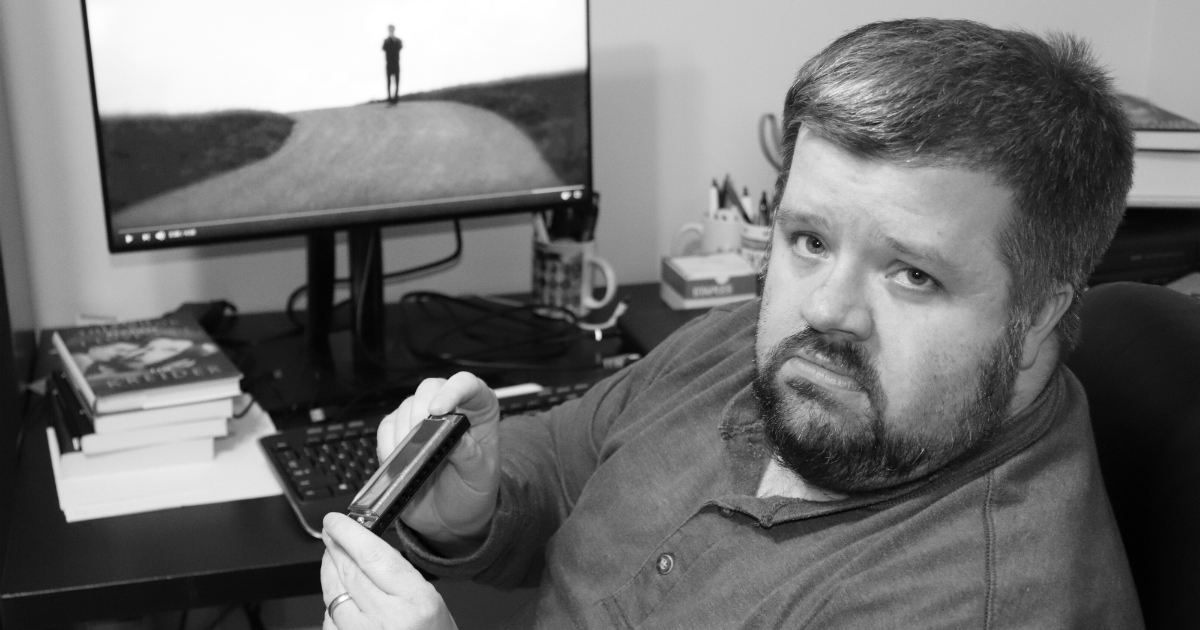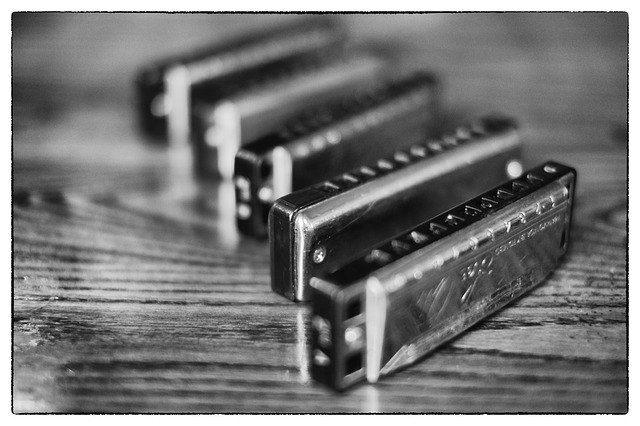I keep this harmonica on one of my shelves. It isn’t very old, Jenny gave it to me a few Christmases ago inside of my stocking. It was a very sweet gesture after we came across one at a gift shop and I got nostalgic about my former dream of being the best harmonica player in the world. The harmonica (or harp, as those of us in the know call it) has always appealed to the melancholy parts of my soul.
The harmonica (or harp, as those of us in the know call it) has always appealed to the melancholy parts of my soul.
The sound resonates through me conjuring images of the lone cowboy meandering through western hills at sunset, the hobo riding the rails, or a prisoner mourning the consequences of poor decisions and his isolation from the only world he’s ever known. I associate it with grown men defiantly dealing with real-world problems on their own.
Harmonicas have a way of capturing the beauty of sadness like no other sound that I know. The violin comes close but brings with it an air of sophistication and privilege that makes it more akin to #firstworldproblems than everyman plights.
Violins have a sense of timelessness and at times sound angelic or mystical. They’re made by master crafters, kept in durable cases and passed down through generations. Harmonicas are down to earth and kept in a pocket or a drawer; they’ve seen some things and been let down a few times, but still persist, piercing the night’s stillness with their mournful tune.
Whereas violins are drawn across carefully set strings, harmonicas form music from our breath, the very essence of life.
Harmonicas take an ordinary medley, strip it raw and spit it back out. On it’s own, it captures loneliness; in a band, it wails the peaks and valleys of the blues.
Of course, there are also happy harmonica moments: campfire folk songs, hoedowns, and new episodes of Roseanne. And my childhood, where for a few brief moments, I thought it could be my calling.
I’ve tried playing many instruments throughout my life – the guitar, drums, recorder, saxophone, a keyboard, and an Irish tin whistle – but the harmonica was the only one I loved.
 I taught myself from the Klutz book, Country and Blues Harmonica for the Musically Hopeless, which was accompanied by an instructional cassette and a Hohner harmonica. I would play along for hours while listening to the cassette on my walkman; it’s how I learned to warble.
I taught myself from the Klutz book, Country and Blues Harmonica for the Musically Hopeless, which was accompanied by an instructional cassette and a Hohner harmonica. I would play along for hours while listening to the cassette on my walkman; it’s how I learned to warble.
The warble is the gateway separating the harmonica from mere tchotchkes like kazoos and recorders. Warbles breathe depth into the sound by bending meaning from the notes and emotion from the tones.
While I could hit the right notes for any song on my fourth-grade recorder, the harmonica’s warble let me modify a song, instill it with emotion and make it a reflection of my prepubescent soul.
I hadn’t yet experienced heartbreak, debt, rejection or regret on the scale of a blues artist, but it felt important in the twilight of my childhood to build the skills to provide an outlet just in case. While I never finished the journey, I walked the path for awhile and got myself a taste.
My abilities peaked with a passable rendition of the Jurassic Park theme song, but my harmonica’s greatest moment of fame was being featured on my public access television show “Surprise, We Found Your Mom!” as an accessory for the character Harmonica Lewinsky, who was subject to exactly the sort of jokes you’d imagine high school seniors would make. Sadly, Harmonica’s celebrity was short-lived as her character was very poorly defined; some viewers even said she sucked.
I was never all that serious about playing the harmonica, but it gave me joy during a short period of my life, much like my comic books and magic kits. And it let me explore in childhood the sort of thoughts and feelings I feared I’d find later on in life.
Sometimes today, I sit quietly at my desk, looking at my five-dollar harmonica and lacking the ability to audibly express my sadness for the life I never led as a rhythm and blues harmonicist. It simply wasn’t meant to be.
Luckily, YouTube provides instant access to the genius of Harproli, who captures the life I could have lived.
If you enjoy my columns, please subscribe below.
Subscribe to future humor columns
If you want to syndicate this column, you may contact me here to discuss the details.
You may notice that I’ve disabled commenting on this post. I’d love to hear your thoughts by email at [email protected].